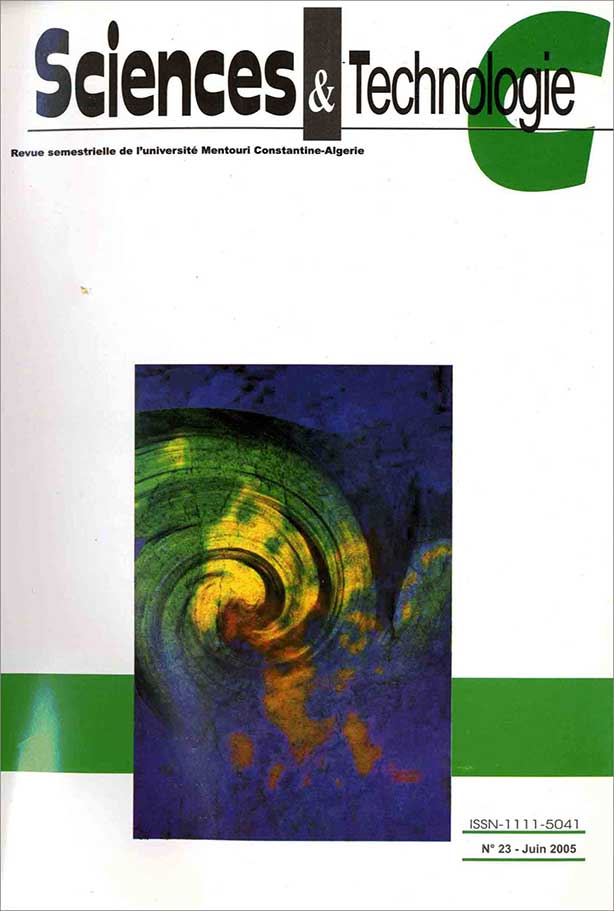EXTRACTION ET PURIFICATION D'UNE AMYLASE THERMOSTABLE A PARTIR D'UN ARCHAEA HYPERTHERMOPHILE
Mots-clés :
Archaea, hyperthermophile, thermostable, amylase, purificationRésumé
La souche HEB prélevée d'une station thermale : Hammam el Bibane (Bordj Bou Arreridj), qui s'est révélée comme souche d'archaea hyperthermophilecultivée dans le but d'extraire et de purifier une amylase thermostable avec les techniques classiques :
• Précipitation au sulfate d'ammonium ;
• Chromatographie sur colonne sur gel de séphadex G-75 ;
• Electrophorèse sur acétate de cellulose.
Le poids moléculaire de l'amylase a été estimé sur colonne chromatographique à 42134 Da, alors que par électrophorèse sur acétate decellulose, il a été estimé à 41853 Da. L'étude de l'effet du pH sur
l'amylase a révélé que cette enzyme a un pH optimum de 6-6.5. L'étude de l'effet de la température sur l'amylase a révélé que l'activité optimale de cette dernière est de 85°C. L'addition de l'EDTA au mélange réactionnel n'a aucun effet sur l'enzyme, ceci permet de conclure que cette dernière n'est pas une métalloprotéine. L'étude de la thermostabilité a montré les temps de demi-vie suivant : 3.66h à 80°C, 3.16h à 85°C et 30 min à 90°C.
Références
Barbier G. "Micro-organismes thermophiles" Bull. Soc. Fr. microbiol., Vol. 9 (1995), pp. 13-18.
Barbier G. "Les enzymes des micro-organismes "extrêmophiles" : une nouvelle source en cours d'exploitation" : In : Les enzymes en agroalimentaire, éd.: tec et Doc, Paris (1997), pp. 324.
Bradford M. "A rapid and sensitive method for the quantification of microgram quantities of protein utilizing the principe of protein dye binding" Anal. Biochem., vol. 72 (1976), 248-254.
Castro G.R., Santopietro D. and Sinerij F. "Acid pullulanase from Bacillus polymyxa MIR-23" Appl.Biochem.Biotechnol., vol. 37 (1992), pp. 227-233.
Cuoquiang D., Veille C., Sarchenko A. and Gregory J. "Cloning, sequencing and expression of the gene encoding extracellular α-amylase from Pyrococcus furiosus and biochimical characterization of the recombinant enzyme" Appl. Environ. Microbiol., vol. 63 (1997), 3569-3576.
Cynthia H., Michael R. and Paul B. "The glucose effect and regulation of α-amylase synthetisis in the hyperthermophilic archaeon Sulfolobus solfataricus" Journal of bacteriology., vol. 178 (1996), 945-950.
Dawson R.M.C., Elliot D.C., Elliot W.H. and Jones K.M. "Colorants et références techniques sur l'électrophorèse de protéines et d'acides nucléiques" Data for biochemical research, Clarendon Press, éd. Oxford (1986), pp. 442-451.
Estelle L., Christine L., Anne G., George B. and Francis D. "Thermstable amylolytic enzymes of thermophilic microorganisms from deep-sea hydrothermal vents" Accadamie des sciences / Elsevier, Paris Animal biology / biologie animale, vol. 320 (1997),
pp. 893-898.
Hanson R.S. and Philips J.A. "Chemical composition in : Manual of methodes for general bacteriology" Gerhard P. èd. american society for microbiology Waschington DC.(1984), pp. 264-328.
Kamoun P. "Méthodes chromatographiques, méthodes électrophorétiques et électrochimiques" Appareil et méthodes en biochimie, ed.: médecine- sciences, Flammarion, (1987), pp. 176-217.
Kenneth A., Laderman S., Bardley R., Davis S., Henry C.K., Marc S.L., Grikos Y.V., Peter L.,
Privalov S. and Christian B.A. "The purification and characterization of an extremely thermostable α-amylase from the hyperthermophilic archaebacterium Pyrococcus furiosus" The journal of biological chemistry, vol. 268 (1993), pp. 24394-24401.
Klingeberg M., Hashawa F. and Antranikian G. "Properties of extremely thermostable proteases from anaerobic hyperthermophilic bacteria" Appl. Microbiol Biotechnol., vol. 34 (1991), pp. 715-719.
Koch R., Lenke K and Antranikian G. "Purification and properties of a hyperthermoactive α-amylase from the archaebacterium Pyrococcus woesi" Arch. Microbiol., vol. 115 (1991), pp. 572-578.
Kuriki T., Okadas S. and Imanaka T. "Purification and characterization of thermostable pullulanase from Bacillus stearothermophilus and molecular cloning and expression of the gene in Bacillus subtilis" Appl. Environ. Microbiol., vol. 54 (1988), pp. 2881-2883.
Nakamura N., Sashihara N., Nagayama H. and Horikoshi K. "Characterization of pullulanase and α-amylase activities of a thermus sp." Starch staerke, vol 41 (1989), pp. 112-117.
Rüdiger A., Jorgensen P.L. and Antranikian G. "Isolation and characterization of a heat-stable pullulanase from the hyperthermophilic archaeon Pyrococcus woesei after cloning and expression of its gene in Escherichia coli" Appl. Environ. Microbiol., vol. 61 (1995), pp. 567-575.
Woese C.R., Kandler O. and Wheelis M. Towords a natural system of organims. Proposal for domains Archaea, Bacteria and Eucarya : Proc. Nalt. Acad. Sci. USA, vol. 87 (1990), pp. 4576-4579.
Yoshihisa T., Akiko K., Naoki S., Yuji S., Tomoko Y., Shinsuke F., Masahiro T. and Tadayuki I. "Purification and characterization of an extremely thermostable cyclomaltodextrin glucanotransferase from a newly isolated hyperthermophilic archaeon, a Thermococcus sp." Appl. Environ. Microbiol., vol. 65 (1999), pp. 1991-1997.
Young C.C., Testsuo K., Haruhiko K., Teruhiko A. and Toshiaki K. "Purification and properties of extracellular amylase from the hyperthermophilic archeaon thermococcus profundus DT5432" : Appl.
Environ. Microbiol., vol. 61 (1995), pp. 1502-1506.

